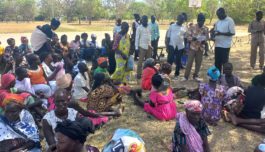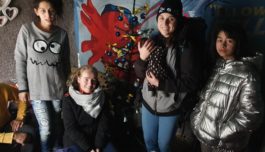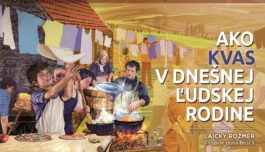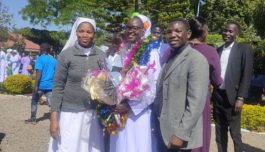The Bosco Boys story is about a home, a school, a church and a playground for rescued children from the streets of Kenya’s capital city – Nairobi. There they go through a rehabilitation process that transforms them. After rehabilitation, they can reintegrate back into normal life and start going to primary school or technical apprenticeships. A powerful testimony on the Bosco Boys YouTube channel is given by the program director Chege Erastus, SDB. He goes on rescue missions directly to the streets and visits families of children who are sometimes difficult to track down. We invite you to watch the video where he talks about life at the centre. Below the video, there is also a transcript.
Welcome to BoscoBoys.
My name is Father Chege Erastus and I am a priest in the catholic congregation the Salesians of Don Bosco. I am currently serving as the director at the Bosco Boys Home – a project that takes care of children in need, particularly boys from the streets. At Bosco Boys, our life begins on the streets where we rescue boys who have been on the streets. We rehabilitate them, we educate them and we integrate them into society and with their families.
We start by making contact with children on the streets and we measure particularly in the age between 8 years old to 17 years old. That is the age we deal with. We go on the streets to rescue them. We start approaching them and trying to make friends with them, we come to them to get to know them. We talk to them to know whether or not they would like to join us, because we only take the ones who want to.
And at our centre in Ingara area in Kariwa slum where we gather them on rescue days or the days before. We talk to make them understand what we have to do and then we invite those who want to join us. Practically, we will accept those who are willing to study and those who are willing to change their behaviour. Because on the streets there are all sorts of behaviour, some have been led into drugs, some to a behaviour that is not acceptable in society. And so, to unlearn those behaviours and habits, they have to be committed to it, because when we accept them into our rehabilitation, we don’t use medication or any coercive means to force them. So we capitalize on their willingness.
Once they decide to join us, we bring them off the streets and into our centre where we do the rehabilitation. That is located on Granata Road next to Karen Hospital, that is where we have the Bosco Boys Langata – our service centre, the stage one of rehabilitation and being into Bosco Boys. At this stage, a boy has to decide to remain. This is the phase where we provide them with basic needs like food, clothing, shelter and also medical care.
We also do home tracing and look for where they come from. We do this by talking with the boys and we believe what they say. At first many of them cheated us with their names, they labelled themselves by names which do not exist or they use false names because they needed to survive on the streets. The more we become friends with them, the more they trust us and are more open with us. Then they tell us their true details about their names, where they come from and even phone numbers where we can contact them. And that is something that we can bounce back from.
We talk to them, finding out where they come from. We are also waiting for their reaction, whether they want to or not to find a home. Maybe the situation at home has not been so nice. Some of them will tell you they don’t even want to go home or they will hide it and say they don’t know their home at all. After some time, generally about a month, they tell us where they came from. Then we make our journey where a social worker goes and even some of our staff (even myself many times) to go and know where the boy comes from. They come from all parts of Kenya, these days we are getting a lot of boys from western and Kisumu and those areas. So we go, we get to know the family and we also collect details, documents and other information that concerns the boy. This helps us to have the proper recovery. We are not doing this process alone, but we are always in contact with the ministry through the children’s ambassador as well as the police who help us in all that concerns, especially legal matters. After getting their details we can process properly the legal and social issues and then the procedure continues. Going to their homes for dressing is not always a pleasant experience, sometimes it is a miraculous coming home experience between the boy and the family. In some other situations, we have found families who do not even want to receive them. But all the same, we mainly look at what the child is comfortable with. If the boy wants to remain at home we integrate him there and if he says he wants to remain with us and get an education, then we give him time. But we stay in touch with the family, relatives or legal guardians and start interacting to help accompany this boy and the process of transformation of the boy.
Our motto is “Here to be transformed”. The transformation is not only in terms of studies, it is holistic. In our rehabilitation program, we also do spiritual formation. We provide a home where he feels loved and cared for. We offer them spiritual nourishment – a church they have to attend Mass every morning, they have to pray. We don’t convert them, but we introduce them to prayer and the spiritual life.
We also offer them a playground. The playground is a key for us because the boys are energetic. They need to exercise, to release their energy into something and also the playground becomes a place of interaction where the true self comes out. We also use this time to teach them discipline because if someone loves football he has to be disciplined and play by the rules to enjoy the game. So we introduce them to various sports activities that help them interact with each other, interact with the staff and all of us so that we now form him and it becomes a holistic home.
Then we also reintroduce them to the school. Remember, boys in the street have been in school at a certain particular time. Not all of them but they have reached a certain stage maybe they stopped studying. So we offer them the opportunity to reintroduce ourselves and find out to check how much they know and how much they don’t know. This is what comes either to help us when we press them into school.
Our rehabilitation process takes from three months to three years. But it can be as few as 3 or 6 months, but it can be also even 1 or 2 years because we look at the possibility, the growth and the maturity the boy has gained. If the boy has made a step to grow, then we promote his next level. The next level is a school which is located in Kuwinda where the child will move. He will move to a class he can fit in. Those who are above the age of 15 are placed in technical classes because they usually are not able to fit in any of the classes. Maybe they have grown in size but they are not even able to comprehend most of the classroom curriculum. So we offer them technical education such as carpentry, welding and cramping etc. We also allow them to learn some bit about mechanics and electricity. After six months or a year, they can decide which course they want to partake in. But the rehabilitation process doesn’t end at school. The person is not fully habited within three months, it is a lifelong process. The staff at the school know this, so they guide the children through it, helping them to catch up. It is a tough job because many of children would like to give up sometimes, especially when the pressure of the days comes. But still, with the atmosphere which adopts them, they can continue. This is one project whether it is the rehabilitation or the school. We are wondering if we understand the children well, we help them to cope with things, to change and to grow. The family is also involved during the process. When the children are in school and it is a time for holidays, we encourage them to go to their homes, where however difficult it is we encourage the parents to come and pick up their children because of the transformation and the complete formation of a child cannot be achieved by us only. The family has to be involved. Eventually, at the end of it, the family is the one who receives the child back to their home.
In our school, we provide them with an education from the preparatory year to the eighth grade. We follow the normal ministry-given syllabus. Even if they have missed and lost a lot, we try as much as possible to give them more opportunities to learn more, to catch up on things and to make them confident that they can do it. The key to transformation is when a boy believes he can do something. That becomes a touch point because he starts believing in himself and grows.
We’ve got boys who have finished primary school here. Then we offer them a chance to go to secondary school or technical school and thus complete their program at our centre. Those who make it also go on to universities. When they are in other schools, their parents or relatives are support from home so they don’t stay with us anymore. Except for the very-very few cases that we keep monitoring. We don’t have a problem if the child is to stay with us for life.
We also have boys and girls who join our primary school from the surrounded slums and communities around us. This helps us to integrate our children so they don’t think they are so special since they come from the street. They interact with regular children. Even at school, they are learning to understand normal life this way. In our primary school, we have up to 250 children this year, but we have the capacity for up to 360 children. We have both boarding and day school. The day school is for those who are coming from around and those from the streets are the only ones who are allowed to board (boys only) in the dormitories. In this programme, we offer them such opportunities as introducing programs that are helping them to grow, learn and live to the fullest. The programs are giving them a safer environment than where they came from.
During the program here at the school and at the rehabilitation centre, we bring them activities that develop their talents, such as sports activities, going to clubs like singing, drama and playing musical instruments. We introduce them to brass band and allow them to learn the guitar, and the keyboard, but also to join in shows, dance, to sing. They enjoy it. This helps them grow, learn new skills and develop their talents as much as possible.
More than three thousand boys and girls have benefited from the Bosco Boys programme. Many of them have finished primary school, many have finished secondary school, and many have completed university, college and technical schools. They are placed in different places all over the country doing various kinds of jobs. We have many partners, friends and supporters who help us in running this project. Our children are not able to afford all that we offer, so we depend heavily on our supporters. We also try to produce something or sustain ourselves. We have a workshop that apart from using it for training the boys we also produce furniture and fabric materials that can be sold and thus make some profit.
We also have a vegetable garden where the children get involved. We produce fresh milk, eggs for the children, and also pork. This supplements our needs at the centre. We are also looking for ways to involve as many boys as possible. We do depend so much on the funding from people whether a country or abroad, whether local people who contribute with love or financially, or with activity. We have volunteers who come to us to help with teaching and taking care of the children. Volunteers come for a short time or for a longer time. People who come to donate to us by a kilo of flour, a bag of biscuits, cooking oil or firewood. All these things have helped us to do what we do and to be where we are. We are grateful to God that we have come this far and we want to continue and we will continue because we want to help as much as possible.
We want to transform not only these boys but the whole society. We want to make a society where every boy and every girl feels accepted. Thank you very much and welcome to Bosco Boys again. Join us in helping these children, join us in saving lives, and join us in rescuing boys from the streets.






